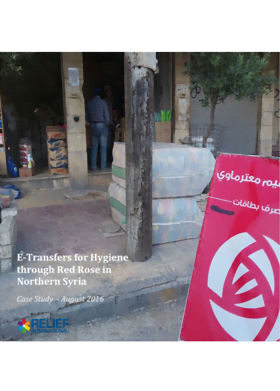E-Transfers for Hygiene through Red Rose in Northern Syria
Cash is receiving a lot of attention globally and is currently being scaled-up at the highest level. On the 9th February 2016, the UN Secretary-General Ban Ki-moon launched his report for the World Humanitarian Summit, calling for cash-based programming to be the ‘default method of support for affected populations where markets and operational contexts permit.’ A Grand Bargain was also widely endorsed at the WHS, where 30 donors and aid agencies signed up to make aid more efficient, streamlined, harmonised and cost effective, including greater use of cash transfers.
The recent CBR-TWG ‘Cash-Based Response Feasibility Assessment in Northern Syria’, in collaboration with Global Communities for Good, John Hopkins School of Health and UNHCR, found that cash was acceptable to 94% of respondents, followed by in-kind (91%) and vouchers (79%). Assessments suggest that hawala networks have the capacity to transfer cash on a broader scale and have proven reliable. Additionally, markets in the surveyed areas of Aleppo, Idlib and Al-Hasakeh indicated a capacity to absorb greater injections of cash. The assessment strongly calls for a shift away from in-kind assistance in Syria towards more cash based approaches, or a blended response, where the situation allows.
Between December 2015 and June 2016, Relief International (RI) Turkey successfully set up and implemented its first pilot, cross-border cash project in Syria to support WASH outcomes. A total 2,352 households in Mar’rat An Nu’man, Idlib province, received e-vouchers through PIN-protected e-vouchers which were distributed, managed and reported through the Red Rose ONECard cash payment system. The e-transfer cash project formed part of a larger OCHA Humanitarian Pooled Fund (HPF) grant with the overall objective to improve access to essential, lifesaving WASH services for vulnerable host community and IDPs through provision of water supplies and maintenance, hygiene promotion and water monitoring.
Overall, for RI, the actual operational management and technical capacity of the project was the biggest challenge, for example related to market and vendor assessments, as well as lack of internalization of cash leading to over-precautionary approach by RI’s security team. RI recognizes a many of the challenges and missed opportunities are internal, predominantly related to early challenges in cash staffing and lack of technical expertise at the country level, something which is being addressed as part of regional and global cash technical capacity strengthening.
The Red Rose ONECard system worked well and had overwhelmingly positive feedback from staff on its functionality and improvements to internal processes, particularly that the reporting and payment system was highly efficient and one of the successes of the project, with ‘perfect reconciliation’. The findings highlight that in addition to the ‘digital’ approach as being superior to paper-based systems, the clear necessity of involving operational teams – namely security, operations and finance – in programme design and implementation for improved project outcomes.



